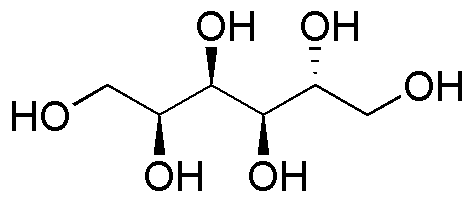D-Sorbitol is widely utilized in research focused on:
- Food Industry: As a sugar substitute, it provides sweetness without the calories, making it ideal for low-calorie and sugar-free products.
- Pharmaceuticals: Used as a humectant in creams and ointments, it helps retain moisture, enhancing the stability and effectiveness of topical medications.
- Cosmetics: Its moisturizing properties make it a popular ingredient in lotions and skincare products, improving skin hydration and texture.
- Biotechnology: Serves as a carbon source in microbial fermentation processes, aiding in the production of various bioproducts.
- Industrial Applications: Acts as a plasticizer in the manufacturing of plastics, improving flexibility and durability compared to traditional plasticizers.
Información general
Propiedades
Seguridad y normativas
Aplicaciones
D-Sorbitol is widely utilized in research focused on:
- Food Industry: As a sugar substitute, it provides sweetness without the calories, making it ideal for low-calorie and sugar-free products.
- Pharmaceuticals: Used as a humectant in creams and ointments, it helps retain moisture, enhancing the stability and effectiveness of topical medications.
- Cosmetics: Its moisturizing properties make it a popular ingredient in lotions and skincare products, improving skin hydration and texture.
- Biotechnology: Serves as a carbon source in microbial fermentation processes, aiding in the production of various bioproducts.
- Industrial Applications: Acts as a plasticizer in the manufacturing of plastics, improving flexibility and durability compared to traditional plasticizers.
Documentos
Hojas de datos de seguridad (HDS)
La SDS proporciona información de seguridad completa sobre la manipulación, el almacenamiento y la eliminación del producto.
Especificación del producto (PS)
La PS proporciona un desglose completo de las propiedades del producto, incluida la composición química, el estado físico, la pureza y los requisitos de almacenamiento. También detalla los rangos de calidad aceptables y las aplicaciones previstas del producto.
Certificados de análisis (COA)
Busque certificados de análisis (COA) ingresando el número de lote del producto. Los números de lote y de partida se pueden encontrar en la etiqueta de un producto después de las palabras "Lote" o "Lote".
Número de catálogo
Número de lote/lote
Certificados de origen (COO)
Este certificado de origen confirma el país en el que se fabricó el producto y también detalla los materiales y componentes utilizados en él y si se deriva de fuentes naturales, sintéticas u otras fuentes específicas. Este certificado puede ser necesario para cumplir con las normativas aduaneras, comerciales y regulatorias.
Número de catálogo
Número de lote/lote
Hojas de datos de seguridad (HDS)
La SDS proporciona información de seguridad completa sobre la manipulación, el almacenamiento y la eliminación del producto.
DownloadEspecificación del producto (PS)
La PS proporciona un desglose completo de las propiedades del producto, incluida la composición química, el estado físico, la pureza y los requisitos de almacenamiento. También detalla los rangos de calidad aceptables y las aplicaciones previstas del producto.
DownloadCertificados de análisis (COA)
Busque certificados de análisis (COA) ingresando el número de lote del producto. Los números de lote y de partida se pueden encontrar en la etiqueta de un producto después de las palabras "Lote" o "Lote".
Número de catálogo
Número de lote/lote
Certificados de origen (COO)
Este certificado de origen confirma el país en el que se fabricó el producto y también detalla los materiales y componentes utilizados en él y si se deriva de fuentes naturales, sintéticas u otras fuentes específicas. Este certificado puede ser necesario para cumplir con las normativas aduaneras, comerciales y regulatorias.

